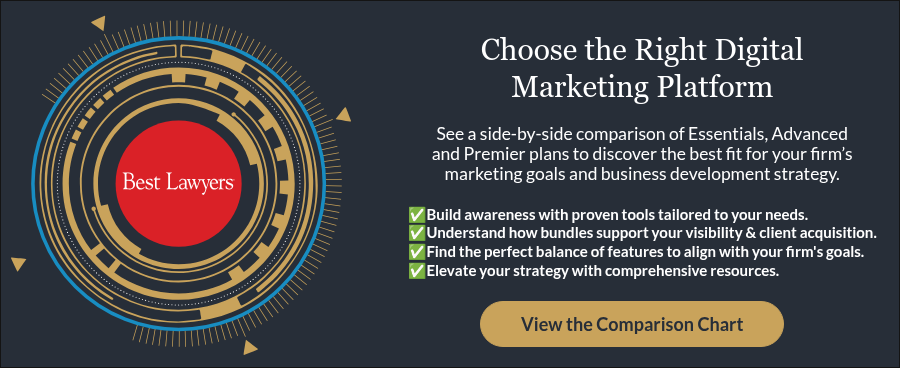Exceptional legal skills are essential, but clients now expect your legal thought leadership to demonstrate visible authority. Law firm thought leadership is crucial for standing out in the industry. Firms that don't lead conversations are losing opportunities to build credibility with clients.
- Clients decide before they call. If your firm is not visible online, strong legal work stays unseen.
- Why it matters now: 96% of legal consumers search online and 77% of general counsel spend hours weekly reading legal insights.
- The risk of silence is real. Low visibility leads to missed matters, fewer referrals and competitors shaping the narrative.
- Practical formats like blogs, LinkedIn posts, webinars and newsletters build trust faster and keep your firm in active consideration.
Adapting to the New Client Mindset in Legal Services
Client habits have shifted in recent years. Before, people mainly chose lawyers through word of mouth. Today, clients research firms online and expect to see proof of legal thought leadership through published content and insights.
Research shows that 96% of clients seeking legal advice use a search engine online. In addition, 45% of law firm managing partners rank thought leadership priority in their top three marketing priorities. Moreover, 77% of general counsels report spending over eight hours each week using thought leadership to stay informed on industry trends.
This reality means law firms thought leadership is no longer optional it is essential to building trust and attracting informed clients.
What Happens When Firms Have a Visibility Gap
When a firm has limited noticeable expertise, potential clients often assume they're less established or overlook it in favor of competitors who actively demonstrate their knowledge.
This invisibility creates a cycle of missed opportunities, including high-value client inquiries, speaking engagements and media or peer collaborations. Without exposure, the firm struggles to showcase its true capabilities and its reputation remains static.
As a result, a firm's exposure gap amplifies competitor voices, allowing others to dominate the conversation. While competitors focus on thought leadership for law firms, silent firms find themselves increasingly marginalized despite their actual capabilities. This growing gap not only limits new opportunities but also affects the firm’s long-term stability, leaving it more vulnerable in a competitive market.
Legal Thought Leadership Is Broader Than You Think
Effective strategies for how to establish legal thought leadership include fast, accessible formats that meet clients where they are. Consider these content types as part of your legal industry content marketing efforts to build authority as a legal expert online:
Blog Posts
Write timely insights on rulings or legislation to show responsiveness, reinforce legal expertise and provide immediate value to your audience. Regular blog posts help you stay relevant in current legal conversations and demonstrate a proactive approach to industry developments.
For example, a divorce attorney who publishes a blog post within 24 hours of a new state ruling to explain its impact on child custody arrangements demonstrates legal thought leadership.
LinkedIn Articles and Posts
Share regular, brief updates that keep you exposed to professional networks without major time commitments. Articles let you explore legal topics in depth, while shorter posts maintain daily engagement with potential clients and referral sources. 81% of lawyers use LinkedIn for professional purposes, emphasizing its role in strengthening credibility and expanding networks in the legal field.
For instance, a lawyer at a family law firm could combine both approaches effectively. They could post brief weekly updates about recent family law developments. Once a month, they could publish a more comprehensive article exploring topics like "How Recent Tax Changes Impact Divorce Settlements" or "Navigating Child Custody in Remote Work Arrangements."
Podcasts
Host conversations that showcase your knowledge and provide insightful discussions on complex legal topics. This format builds trust with listeners by offering a conversational approach that fosters deeper connections through authentic, expert-driven dialogue.
As an example, an intellectual property attorney could host a biweekly podcast interviewing industry leaders about emerging intellectual property challenges. By explaining practical implications of new legislation, they could have created an accessible resource that requires minimal preparation time while effectively building trust with potential clients.
Webinars and Virtual Panels
Lead interactive sessions that scale your experience and demonstrate your communication skills. Legal webinars and panels provide a platform to discuss in-depth legal topics, answer audience questions in real time and position your firm as a thought leader in your area of law.
Client Newsletters
Send updates to maintain client relationships and provide guidance they can act on. Newsletters keep your audience informed about key legal developments, industry trends and updates from your firm. Email newsletters are now a key tool for legal marketing, with 41% of law firms using them in 2025, up from just 26% in 2020.
To illustrate, a small employment law practice could send a monthly newsletter highlighting recent workplace legislation, compliance reminders and brief case takeaways. Clients could use it to stay informed and often reach out with follow-up questions, deepening the advisory relationship.
Infographics and Videos
Simplify complex legal topics with visual formats that make knowledge more accessible. Legal infographics break down information into clear, easy-to-understand visuals, while videos can explain legal concepts or showcase firm accomplishments in an engaging, shareable way. In 2025, 89% of businesses use video as a marketing tool, making it a proven strategy to connect with a wider audience.
For instance, a corporate attorney might use a short video to walk through the key stages of forming a Limited Liability Company (LLC) or publish an infographic showing how recent regulatory changes affect contract compliance, helping business owners quickly understand their legal obligations.
Case Studies and Tools
Showcase real examples of problem-solving and reinforce a client-focused approach. Case studies demonstrate your firm’s ability to address client challenges, while tools like templates and checklists can offer immediate value to clients, helping them solve problems on their own.
For example, a corporate attorney could offer anonymized case studies showing how they helped small businesses navigate regulatory compliance, alongside a downloadable "Business Formation Checklist" that prospective clients could use immediately.
By sharing these effective strategies, firms build credibility with clients. However, firms do not need to control all channels, consistency on a few strategic platforms can also build lasting authority.
Legal Thought Leadership and the Business Impact
The investment in thought leadership creates a divide between firms embracing this strategy and those ignoring it. The business consequences of this choice become apparent over time.
Firms That Prioritize Legal Thought Leadership
Investing in legal thought leadership creates business advantages for forward-thinking firms. Those who consistently demonstrate their knowledge publicly experience accelerated trust-building with prospective clients, often leading to faster decision-making.
These firms also attract higher-value engagements as clients associate visible expertise with distinguished service. Firms known for thought leadership generate substantially more referrals both from industry peers who recognize their authority and from former clients who remain engaged with the firm's content.
Firms That Overlook Legal Thought Leadership
Those without strategic thought leadership face increasingly slower growth as competitors capture market attention. They find it difficult to gain distinction in saturated practice areas where technical skill alone no longer provides a competitive edge.
Over time, this visibility gap creates real branding challenges, with some firms facing stagnation despite consistently strong legal work. Law firm branding through thought leadership addresses this gap directly, offering long-term value that extends beyond marketing to support overall business health.
Visibility Is the New Currency of Trust
Distinguished legal work alone doesn't win clients anymore. Without exposure, your firm's excellence remains hidden from those who need it most. Legal thought leadership transforms your expertise into tangible proof of value that clients can see before they initiate a consultation. The most successful firms now recognize that establishing authority isn't optional, it's essential for building trust, demonstrating expertise and securing business growth.
When firms are ready to put that approach into practice, the Best Lawyers Digital Marketing Platform provides the structure to do so. With strategic tools including content distribution features, our network is built to increase recognition, reinforce authority and enhance client engagement











































